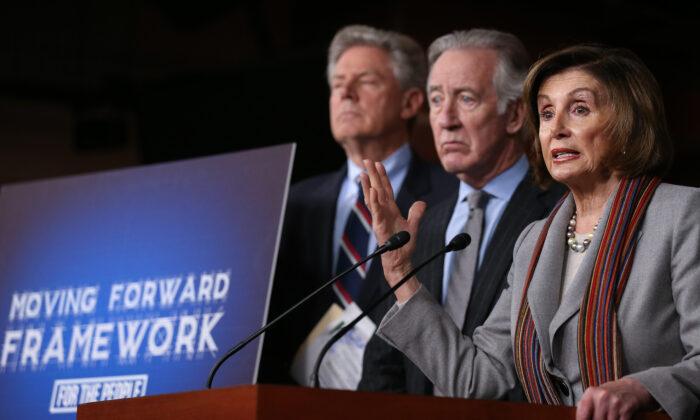The Committee for Responsible Federal Budget (CRFB) said in their policy analysis of the House’s $1.9 trillion COVID-19 relief bill, details of the legislation indicate a trend of funds being rerouted to non-pandemic priorities, which are unrelated to providing relief.
The CRFB is a nonpartisan, non-profit organization dedicated to informing the public on fiscal policy issues that would impact them. The group’s leadership is comprised of leading budget experts, including former heads of the House and Senate Budget Committees, the Congressional Budget Office, the Office of Management and Budget, the Government Accountability Office, and the Federal Reserve Board.
According to the analysis, about 1 percent of the $1.9 trillion will go toward vaccines, and only another 5 percent is targeted toward mitigating the public health problems caused by the pandemic.
Meanwhile, “nearly half of the package will be spent on poorly targeted rebate checks and state and local government aid, including to households and governments that have experienced little or no financial loss during this crisis,” said MacGuineas.
MacGuineas criticized the House Ways and Means Committee’s decision to limit unemployment benefits to Aug. 29, in order to use that money for pension bailouts. “The financial status of these funds (multi-employer pensions) shouldn’t be addressed in a piece of crisis legislation, and certainly not at the cost of benefits for unemployed workers.”
“Over the last two days, the Ways and Means Committee has considered aggressive, science-based solutions that will deliver the urgent relief our country so desperately needs. From unemployment benefits to health care affordability, the work we’ve done is substantial,” Neal said.
Besides the pension bailout, the CRFB also criticized expanding the child tax credit and earned income tax credit, increasing Affordable Care Act subsidies, and boosting the minimum wage, saying the provisions are not related to pandemic relief.
“This legislation is supposed to be about ending the pandemic, reviving the economy, and providing Americans the financial relief they need to make it through this tough stretch. We support a targeted package that does just that. It is disappointing to see House committees straying from that mission. It’s time to refocus,” said MacGuineas.
The House Ways and Means Committee did not immediately return a request for comment.






Friends Read Free